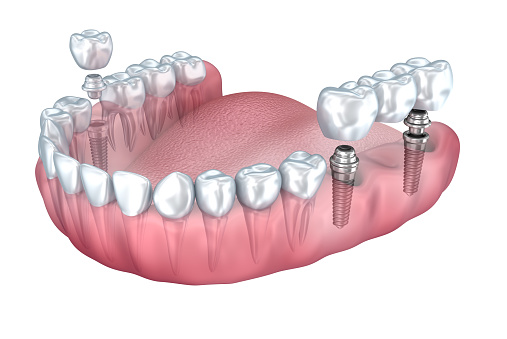Multiple Tooth Replacement

Multiple tooth replacement refers to the process of replacing several missing teeth within the mouth. There are various options available for multiple tooth replacement, depending on the specific circumstances and needs of the individual.
Here are some common methods:
1. Dental Implants: Dental implants are a popular choice for multiple tooth replacement. Implants are artificial tooth roots that are surgically placed into the jawbone, providing a stable foundation for dental prosthetics. Multiple implants can be used to support individual crowns or implant-supported bridges or dentures, effectively replacing multiple teeth.
2. Fixed Dental Bridges: A fixed dental bridge involves creating a prosthetic tooth or teeth (pontics) that are supported by crowns on adjacent healthy teeth. In the case of multiple missing teeth, a series of connected pontics can be created to fill the gaps. The bridge is then cemented or bonded into place, providing a functional and aesthetically pleasing restoration.
3. Removable Partial Dentures: Removable partial dentures are another option for replacing multiple missing teeth. These dentures consist of replacement teeth attached to a pink or gum-colored acrylic base. They are designed to fit around the remaining natural teeth and are held in place with clasps or attachments. While they offer a removable option for tooth replacement, they may not provide the same level of stability as dental implants or fixed bridges.
4. Implant-Supported Dentures: For individuals with multiple missing teeth, implant-supported dentures can be a suitable choice. These dentures are designed to be supported by dental implants, providing increased stability and improved function compared to traditional removable dentures. Implant-supported dentures can be either fixed or removable, depending on the individual’s preferences and oral health condition.
It’s important to consult with a dentist or prosthodontist to determine the most appropriate option for multiple tooth replacement based on your specific dental condition, bone health, budget, and desired outcome. They will conduct a thorough examination and discuss the advantages and disadvantages of each treatment option, helping you make an informed decision.
Frequently Asked Questions
1Q. Can you replace multiple teeth at once?
Ans: Yes, at Finedent Dental Clinic in Nanakramguda, Hyderabad, we specialize in replacing multiple teeth at once, providing a comprehensive solution for restoring your smile.
2Q. How much does it cost to replace multiple teeth?
Ans: At Finedent Dental Clinic in Nanakramguda, Hyderabad, the cost to replace multiple teeth varies based on individual needs. Schedule a consultation for personalized pricing tailored to your specific case.
3Q.Can you replace 3 teeth?
Ans: Absolutely, Finedent Dental Clinic in Nallagandla, Hyderabad, offers effective solutions to replace 3 teeth, with treatment plans customized to address your dental needs and restore functionality.
4Q. Is tooth implant painful?
Ans: At Finedent Dental Clinic in Nallagandla, Hyderabad, tooth implant procedures are performed under local anesthesia, ensuring a comfortable and minimally painful experience for our patients throughout the process.
